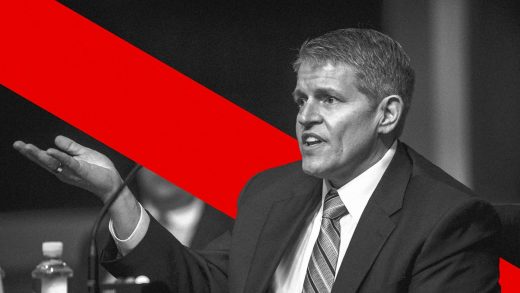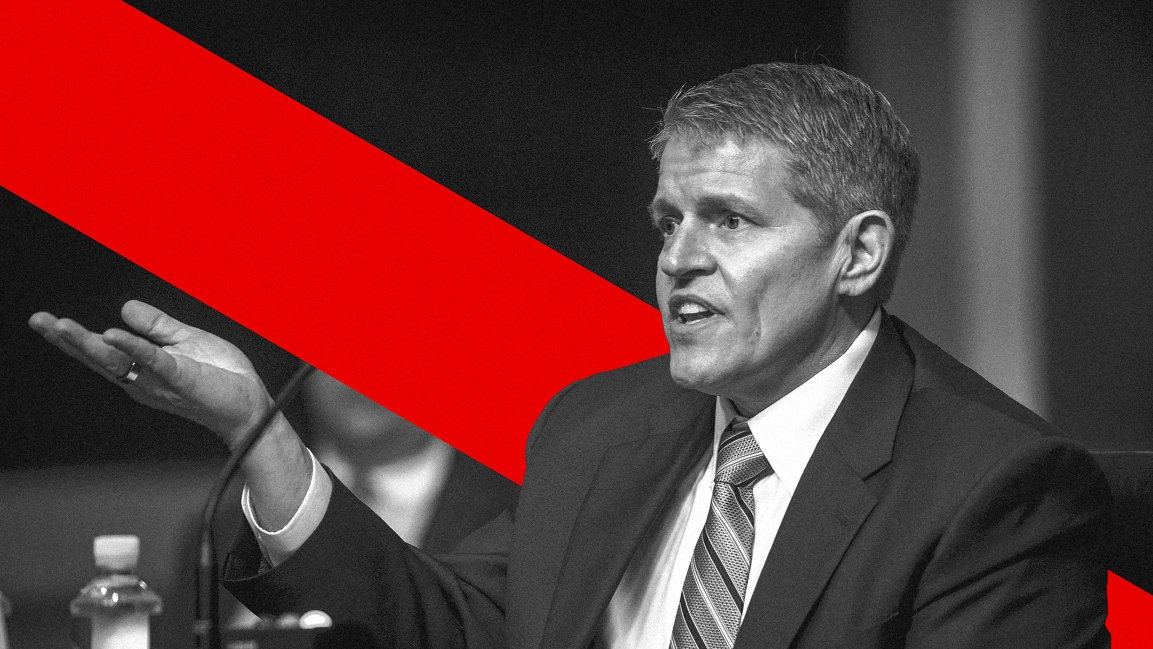How Biden’s pick to head the ATF was derailed by intense opposition from gun rights groups
Aware that the Democrats did not have enough votes on the Senate floor to confirm Chipman, the White House withdrew the nominee without Majority Leader Chuck Schumer ever taking the vote to the floor. Joining all 50 Republican senators voicing opposition against Chipman was habitual centrist holdout Joe Manchin of West Virginia, who had originally appeared open to Chipman—as well as one usually quiet senator, Angus King of Maine.
Chipman, who describes himself as a “gun violence prevention expert,” spent 22 years at the ATF, including as special agent, and as a chief of firearms enforcement. After leaving the agency, he worked as an advisor to gun reform groups, including Everytown and Giffords. He’s been vocal in his support for tightening background checks, instating high-capacity magazine limits—and banning the AR-15, the rifle that has come to be associated with recent mass shootings. Following the shootings in March 2020 in Atlanta and Boulder, Colorado, rising urban gun violence, and unprecedented gun sales, Biden nominated Chipman, a self-declared “gun reformist,” as his nominee.
Chipman represented the best shot at some long-awaited, modest form of gun control. In response, gun rights groups launched unprecedented ad campaigns to derail the nomination. Gun violence prevention groups say that the ATF’s leaderless state is the way the gun lobby wants to keep it—after the agency has already been blunted by NRA and Republican pressure to shackle its enforcement power in past years.
A large focus of the ATF’s enforcement work is tracing and preventing the trafficking of illegal guns, from states or cities with looser gun laws to those with tighter ones but with high crime, such as, from Indiana to Chicago. Chipman’s time at the ATF was spent largely looking into the transport of illegal guns from Virginia to New York City. These are guns that are responsible for day-to-day urban violence, which has increased during the pandemic. But, the potency of the ATF had already been subdued due to the work of the NRA in recent years—in fact, the whole reason that the Senate has had to confirm the agency director since 2006 is due to its lobbying success. Since 2003, the Tiahrt Amendment has restricted the ATF from digitally storing its firearms-tracing data and from releasing it publicly, including for the purpose of academic research or civil lawsuits against gun sellers.
Kris Brown, president of Brady Campaign to Prevent Gun Violence, says focusing on guns used in crimes is an area where a reenergized ATF with a new director could have a major effect without Congress having to pass any new laws. It could have a laser focus on using its tracking data on “crime guns,” or guns recovered from crime scenes, 90% of which can be traced back to 5% of gun sellers. The ATF could put its resources into investigating those dealers and pursue penalties for violations of gun-sale rules, including shuttering them, if they’re found to be “flagrantly violating the law.”
This all seems in line with what the gun lobby says it wants. Now that the NRA is clouded in stigma and has less money to pump into obstruction (legal investigations into its corrupt financial practices began in 2019, leading to its declaration of bankruptcy earlier this year), the National Sports Shooting Foundation (NSSF), a trade association for the gun industry has become a premier funder among the gun lobby. Its director, Mark Oliva, says the ATF director should indeed provide oversight of the firearms industry. “We want to make sure that those who shouldn’t have their hands on a firearm never get their hands on a firearm,” he says. “I do want to make sure that our industry is working within the bounds of laws and regulations.”
But gun rights groups assumed that Chipman’s potential actions would also affect law-abiding gun buyers and gun dealers. They say that, despite his years at ATF, he wasn’t experienced enough, and cited his involvement with Giffords and Everytown as a red flag, equating it to “if Trump had nominated someone like [NRA VP] Wayne LaPierre.” That frame of thinking, that Biden had politicized his pick, clearly rubbed off on GOP senators. Chuck Grassley said the nomination was like “putting a tobacco executive in charge of the Department of Health and Human Services.”
Fred Guttenberg, a gun safety activist who lost his daughter, Jaime, in the 2018 Parkland shooting, counters that it was completely irrelevant that Chipman was a gun safety advocate—because the ATF doesn’t pass legislation, anyway. “He simply follows the laws on the books,” he says. “It’s a red herring. It’s a bogus argument. But those are the kinds of arguments that have kept this country without a permanent ATF director now since 2015.”
Still, the NSSF is concerned about the potential for an AR-15 ban and the implementation of universal background checks. “He is not about lawful gun ownership,” Oliva says, of Chipman. “He wants to put extra qualifications on my ability to exercise my Second Amendment rights.” The NSSF opposes clamping down on “ghost guns “and pistol braces, which an emboldened ATF could decide it has the authority to do. And, Oliva took offense to a comment Chipman made on TV, where he seemed to joke about the prepper-like hysteria of first-time gun buyers during the pandemic, saying they should store the guns “behind the cans of tuna and beef jerky they have stored in a cabinet, and only bring that out if the zombies start to appear.”
In response to the nomination, the NSSF launched an unprecedented barrage of ads in states with moderate Democratic senators, hoping they’d convince them to vote against Chipman’s confirmation. They got through to one unlikely senator in particular: Angus King of Maine, an Independent who votes with the Democrats. Though he met with gun violence groups, and was also entreated by families and survivors of gun violence to vote for Chipman, King, concerned about the gun owners in his state (about 47% of Maine’s population own guns, a figure above the national average), eventually became one of the two Democratic defectors, along with Manchin.
Guttenberg was one of the advocates who met with King. “He wasn’t focused on the full resume of David Chipman. He was focused on what this group out of Maine was telling him,” Guttenberg recalls, referring to the Gun Owners of Maine, which had lobbied the senator.
At the same time, anonymous disinformation campaigns appeared on social media targeting Chipman. One, known as “Waco Dave,” placed a photoshopped figure of Chipman as an FBI agent at the Branch Davidian compound in Waco, Texas, during the government raid in 1993, in which 76 people were killed, and which greatly soured public opinion of the ATF. The campaigns also made unfounded accusations that Chipman had racially discriminated against ATF agents during his time at the agency, which Senator Dick Durbin said was an effort to “unfairly derail” the nomination and tarnish Chipman’s reputation.
It’s unclear who Biden will nominate now. But Brown believes that the gun lobby will continue to obstruct any nominee to keep the comfortable status quo of a director-less ATF. Without a permanent director, “You’re simply treading water,” she says. Adds Guttenberg: “You could throw in the name Joe Smith, they don’t care. They would do the same thing with the next one.” Oliva denies that assertion, saying that the NSSF backed both Obama’s and Trump’s nominees, and that his group simply wants someone at the helm who’s politically independent and that they can work with. The NRA, however, rallied against even Trump’s nominee, Chuck Canterbury, former president of the national Fraternal Order of Police, persuading Republican senators to conclude that he was also too inclined to pursue gun control.
Whatever the case, the gun lobby as a whole has blocked every candidate other than Jones since 2006. And Chipman’s withdrawal is a loss for any immediate hope of modest gun reform. “Why do people act or presuppose that someone who actually cares about gun violence is a bad candidate to run the ATF?” Brown says. “That would be my question.”
(54)



